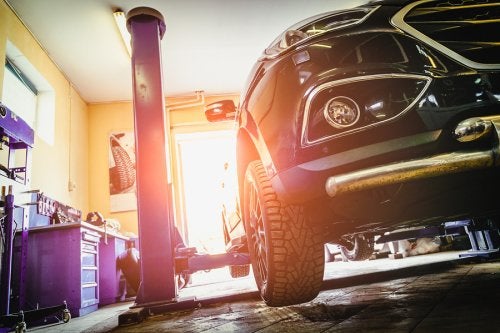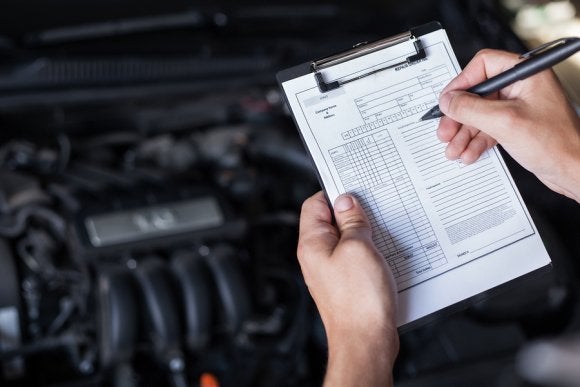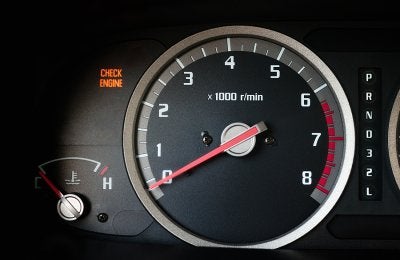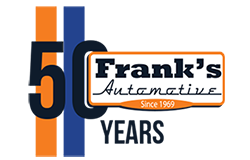-
What You Should Do After an Accident
While an automotive collision may cause visible damage to your car body, it can also cause problems under the hood. After you experience an accident while driving your car, do not hesitate to visit Frank’s Automotive for engine repair near Sacramento. Even if you are not aware of engine issues after an accident, your car may be suffering from serious and lingering issues that will cause further problems in the future.
When you bring your car to Frank’s Automotive for engine repair, we will start your appointment with a comprehensive diagnostic service. If your check engine light is illuminated, we can use our equipment to obtain your computer’s trouble code. Using our certified parts and tools, our team of mechanics will be able to repair any engine damage that was caused by your collision. We will make sure that you drive out of our repair shop with total confidence in the performance and safety of your vehicle.

-
Intermediate Shaft Bearing Failure IMS Failure
Some of the most frequently asked questions about early water cooled Porsche boxer engines are, “how do I know when my IMS is failing,” “does my car have an IMS problem, and if so, do I need to worry about it?”. These are all good questions. I could try to explain this to you in technical mumbo jumbo, but you’d get about half way through it and turn the page. I’m going to do my best to explain it to you in layman’s terms based on my observations.
What is an intermediate shaft, you ask?
An intermediate shaft is used to transfer motion from one component to another, via chains. In this case, it is transferring motion from the crank shafts to the camshafts. It also keeps everything in time and rotating in unison, like the gears in a fine clock.
Early air cooled Porsche’s had a short intermediate shaft that is driven off of the front of the engine, transferring that motion to the cam shafts. Both camshafts are driven at the front of the engine. The shaft is supported by bearings that are lubricated by the engine’s oil system (Mezger Design).
With the introduction of the Boxster, Porsche went to a long shaft. This configuration drives 1 cam at the front of the engine and 1 cam at the back. It is supported at the front by an oil fed bearing and at the back by a sealed, self contained steel roller bearing. That roller bearing has it’s own lubricant that is meant to keep the bearing lubricated for the life of the vehicle.
Here is where the problem lies. Over time, the seals on the bearing fail, the lubricant that is meant to last the life of the engine escapes. Now there is no lubrication, and the friction destroys the steel bearing. This allows the the chains to become loose and come out of time. When the engine is out of time, pistons and valves “come into contact” (putting it mildly) with each other. Just like the gears in a clock, if they come out of alignment it will no longer keep time. Accept the consequences are more catastrophic with your engine, resulting in complete engine failure.
Which cars are affected?
All Boxsters from 1997 to 2008, Normally Aspirated 911’s 1999 to 2008, & Caymans 2006 to 2008.
996 & 997 Turbo engines are not affected by the IMS Failures. Their engine design is very similar to the air cooled engines (Mezger Design) & are not prone to failure.
What changed after 2008?
With the introduction of the 2009 models, Porsche redesigned or retro-designed their engines. They scrapped the long shaft design and returned to the original short shaft design. Bearings are lubricated by the engine’s oiling system, no longer rely on a self contained bearing.
Which cars have serviceable IMS Bearings?
From 1997 to 2004 all normally aspirated boxer engines have IMS’s that are serviceable. On the earlier cars, the most opportune time to replace them is during a clutch job, because in order to get to the IMS Bearing, the clutch & flywheel have to be removed. Unfortunately, on Tiptronic cars, there really is never an ideal time to do it. The transmission & flex plate will need to be removed. Later cars (2005 to 2008), require dismantling engine to replace the bearing. This is because the bearing can not be pulled through the case opening like the earlier cars. A boss prevents the bearing from being pulled out through the case opening.
How can I tell if my IMS Bearing is failing?
This can be difficult. Monitor oil leaks, especially from the bellhousing area. This could indicate that your bearing is or has failed. When bearing begins to wobble, oil will leak from the support shaft. You should have your oil filter inspected at every oil change. By cutting the end caps off, opening the filter up you can look between the pleats. If see any silvery metal in the pleats this could be a sign that your IMS is failing. The only problem with this method it is only a snapshot in time. Weeks or days later your bearing can start to fail, and you may have no idea. We have noticed that most failures occur with lower mileage cars, tiptronic cars, cars that are driven in lower rpm range. This is not to say high mileage cars or manuals are exempt from the problem, but it is a trend that we’ve noticed over time.
What else can I do to be proactive?
There are monitoring systems on the market. LN engineering (lnengineering.com) has developed an early warning system that can detect ferrous material in the oiling system. Once it detects the presence of material, it sets off a warning light. This allows you to shut the engine off, have it towed to a shop to perform an IMS Update hopefully in time. LN Engineering is at the forefront of IMS Bearing failure analyst & solutions. They currently have 2 retrofit options available. The first option is for single row or double row bearings. It is a Ceramic Ball bearing design. Ceramic bearings are harder, more durable than steel bearings. This is design is recommended to be replaced every 75,000 miles or 6 years. The second Option is a plain bearing that is oil fed, like the main & rod bearings in your engine. This setup is a more involved, requiring a new spin on oil filter, oil line installation & modification to the engine case. It is a bit more involved, but it’s also designed to last the life of the engine.
How to extend the life of your IMS?
First, DRIVE YOUR CAR! As stated earlier, the lower mileage vehicles seem to have the highest rates of failure. Second, drive your car like it was meant to be driven. Low rpm’s tend to be detrimental to the IMS. The analogy we use is, “you own a thoroughbred not a plough horse.” They are meant to be driven at the higher rpm range. We recommend keeping the rpm’s up above 2500 rpms. This may lower your fuel mileage, but if you’re concerned about fuel mileage, buy a hybrid. Lastly, ALWAYS do your routine oil changes. Splitting the recommended service interval in half, or changing your engine oil at least once a year allows us to keep an eye on debris in the filter, which is always beneficial.
So what can we take from all of this?
Earlier design had some inherent problems, but even then, the failure rate hovers around 10%. It is a bit of hit and miss whether your car will be affected or not. If you own an early car (1997 to 2004), it is a good idea to have your IMS updated, especially when performing any clutch work or anytime your transmission has to be removed. Have your oil filter inspected at every oil change & have your oil changed more frequently. If you drive your Porsche as a daily driver, we recommend splitting that interval at least in half. If it’s not driven as much have it changed once a year. Check for oil leaks noting where they are coming from. Finally, enjoy your Porsche! Drive your car, and by all means, drive it the way it was meant to be driven, Obey All Traffic Laws (wink wink), but keep the rpms up. SVR-PCA events, like tours and rallies, are a perfect way to stretch your Porsche’s legs. It may sound counterintuitive, but you’ll find the more you drive your Porsche the fewer problems you will have. Neglect and underuse are the enemies of all vehicles. Get out there drive and enjoy!
(This is an article by Nick Lettini of Frank’s Automotive for the local Porsche Club Monthly Publication) – https://svr-pcaor.org/wp/wp-content/Drifter/2017/201705.pdf
-
Should You Have a Pre-Purchase Inspection?
If you are looking to buy a vehicle without spending too much money, you may look towards used cars. Although this can be a great way to find the car you need for a reasonable price, it is a good idea to have a pre-purchase inspection in Sacramento before you offer your signature. This type of assessment can give you the peace of mind you need to be confident in your purchase, and it can help you steer clear of vehicles with hidden problems that you would otherwise need to address on your own. Here is a closer look at pre-purchase inspections.
A pre-purchase inspection gives you the opportunity to make the most informed decision possible when buying a car. Some car salespeople are more trustworthy than others, and the shadier ones might try to pull some tricks to get you to buy a car that’s not worth purchasing. A pre-purchase inspection will give you an accurate idea of what kind of shape the car is in and what types of repairs might be necessary in the future. After this kind of inspection, you should have a better idea of whether or not the car in question is right for you.

-
Reasons Your “Check Engine” Light Is On
One of the great things about modern cars is how they keep drivers informed about problems that are developing. A quick glance at the dashboard can tell you if your tires are low, if you need an oil change, or if your car’s battery is drained. Unfortunately, not all dashboard warnings are that clear or easy to understand. One of the reasons why the “check engine” light is so worrisome for drivers is because of the large number of mechanical and electrical problems that can cause the light to come on. The only way to know for sure is to visit an auto repair shop in Sacramento that specializes in check engine light diagnostics . In the meantime, here’s a look at some the reasons your car’s check engine light might be on.

Loose Gas Cap
Believe it or not, that check engine light might be as easy to fix as tightening your gas cap. Various engine sensors can tell when the gas cap is loose (or cracked and not fitting properly), causing the check engine light to illuminate. If your gas cap seems to be cracked, replace it and see if that fixes the problem before you bring your car to an auto repair shop for electronic diagnostic services.Faulty Oxygen Sensor
One of the most common check engine light causes in a faulty oxygen sensor. There are a number of reasons why the O2 sensor can fail, including corrosion due to internal engine leaks and using gas with a higher ethanol concentration than the engine is designed to handle. If the O2 sensor is to blame, it’s in your best interest to have it repaired or replaced as soon as possible as a faulty oxygen sensor can cause a significant drop in fuel economy.
Broken Thermostat
A car’s thermostat regulates engine temperature by opening and closing to regulate the flow of coolant. Over time, the thermometer can become corroded and fail to properly regulate the engine’s temperature. If this happens, the check engine light can come on so you seek auto repair and fix the broken thermostat to keep the engine from overheating.
-
Improving Your Engine’s Performance
When you set up auto repair in Sacramento, you may want to ask your mechanic about the possibility of performing engine enhancements on your vehicle. A shop that specializes in German automotive repair will have the tools and experience needed to provide you with top quality engine repair, and may also be able to install features that will help to boost the speed and power that is offered by your German car’s engine In addition, your auto mechanic may be able to install aftermarket accessories that will enhance your car’s performance ratings. With custom engine tuning from a German car maintenance professional, you will be amazed at the driving dynamics that your car has to offer you. For a closer look at how to improve your engine’s performance, watch this video from Mobil 1.
-
The Importance of Transmission Maintenance
Whether you drive a car with an automatic or manual transmission, there will eventually come a point in the lifespan of your vehicle when you need to schedule transmission repair. Since your transmission is responsible for delivering power from your engine to your wheels, a transmission repair problem can be a serious issue for your car. Fortunately, with the help of an auto shop offering German transmission repair in Sacramento, you can restore your car’s transmission to peak working condition. Let’s take a look at why transmission maintenance is so important for your vehicle.

Prevent Overheating
One of the primary reasons to schedule transmission maintenance at the first sign of an issue is that proper transmission repair can help prevent overheating in your vehicle. Like many other components in your car, your transmission requires fluid in order to remain cooled and lubricated. By maintaining your transmission, you can make sure that your transmission fluid is always at the proper level.
Avoid Low Transmission Fluid
To prevent serious problems from occurring in your transmission, it is important to avoid letting your transmission fluid get too low. When your transmission fluid is running low, the many moving components of your transmission could experience extreme wear and strain. During a transmission service, your technician will take the time to check the levels of your transmission fluid. If a fluid leak is detected, this problem can be solved before it becomes a more serious mechanical issue.
Extend Overall Lifespan
Finally, one of the most important reasons to schedule regular transmission maintenance is that caring for your transmission can help to extend the overall lifespan of your car. When your vehicle’s transmission wears out, the driving performance of your car could become severely compromised. By taking the time to set up transmission repair at key intervals in the life of your car, you can help keep your luxurious German auto on the road for as long as possible. Your mechanic can provide you with more information about the benefits of routine transmission maintenance.
-
Frank’s Automotive Diagnostics Services
People visit their doctors for a health checkup all the time, and yet few people every take such precautionary measures with their vehicles. However, there are just as many benefits of knowing the health and condition of your car as there is of knowing your own physical health. Fortunately, Frank’s Automotive in Sacramento offers automotive diagnostics services that can give you a detailed overview of your vehicle’s condition. By knowing the state your car is in, you can prevent minor problems from getting worse and costing you more in automotive repair costs later on down the line. Diagnostics can also save you time and frustration by helping to prevent a break down later on.
To learn more about Frank’s car diagnostics services, call (916) 28-8297. You can also schedule a diagnostics appointment online. When you call, be sure to ask about Frank’s current automotive maintenance and repair specials.
-
How Often Should You Change Your Oil
The old rule of thumb regarding oil changes (every 3,000 miles or three months) doesn’t necessarily hold up today. Although this is a great benchmark to stick to, modern engines and new oil additives and technologies have allowed drivers to go much longer in between oil changes. It depends on the age and condition of your vehicle, as well as the type of oil you put in the engine. Watch this video to learn more about oil change intervals.
To take the guesswork (and grease work) out of changing your car’s oil, bring it to a car repair shop in Sacramento. An experienced mechanic will be able to change the oil in your vehicle and get you back on the road in no time at all. When you visit an auto shop for the first time, ask the mechanic for a recommended oil change interval based on the age and condition of your engine. Your mechanic may recommend a different maintenance schedule from what’s in the owner’s manual based on the condition of your vehicle.
RECENT POSTS
categories
- Uncategorized
- Automotive
- automotive diagnostics services
- Frank’s Automotive
- auto shop
- oil change
- Auto mechanic
- Maintenance
- maintenance schedule
- Catalytic Converter
- Engine Light
- oxygen sensor
- Transmission Problems
- BMW
- Pre-Purchase
- Brakes
- Anti-Lock Brakes
- Auto Diagnostics
- Alternator Repair
- Slipping Transmission
- Engine Trouble
- Brake Sounds
- Frank’s Automotive
- Frank Lettini
Archives
2022
2020
2019
2017
2016
- December (4)
- November (5)
- October (4)
- September (4)
- August (4)
- July (4)
- June (4)
- May (4)
- April (4)
- March (4)
- February (4)
